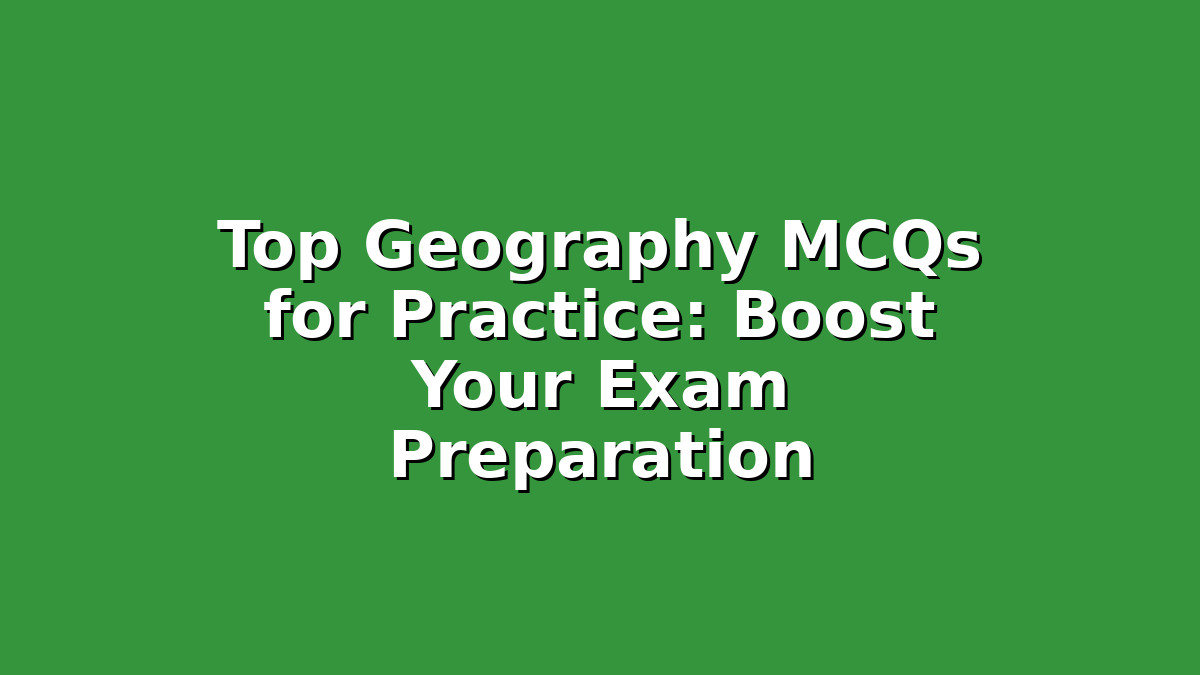Geography is a fascinating subject that helps us understand the world we live in—from the physical landscapes to human societies and how they interact. For students preparing for exams, mastering geography concepts can sometimes feel overwhelming, especially when faced with a vast syllabus. One of the most effective ways to reinforce your learning and improve your exam performance is through practicing Multiple Choice Questions (MCQs). MCQs help you test your knowledge, identify weak areas, and get familiar with the exam pattern.
In this article, we will explore the top geography MCQs for practice and share practical study tips to help you maximize your preparation. Whether you’re studying for school exams, competitive tests, or simply want to sharpen your geography skills, this guide will support you in achieving your goals.
Section 1: Why Practice Geography MCQs?
MCQs are a staple in many geography exams because they test both factual knowledge and conceptual understanding in a concise format. Here’s why practicing them regularly is beneficial:
– Efficient Revision: MCQs cover a broad range of topics quickly, allowing you to review multiple concepts in a short time.
– Exam Familiarity: They help you become comfortable with the question style and manage your time effectively during the real test.
– Identify Knowledge Gaps: When you attempt MCQs, you can immediately spot concepts you haven’t mastered and focus your studies accordingly.
– Enhance Memory Recall: The multiple-choice format encourages recall of key facts, terms, and data, reinforcing your learning.
– Build Confidence: Scoring well in MCQ practice tests boosts your confidence and reduces exam anxiety.
To take full advantage of these benefits, it’s important to practice MCQs thoughtfully. Don’t just guess answers; try to understand why an option is correct or incorrect. Reviewing explanations after each question will deepen your understanding.
Section 2: Top Geography MCQs to Practice
Below are some sample MCQs covering essential geography topics that you should practice regularly. These questions represent common themes in exams and help strengthen your foundational knowledge.
1. Physical Geography
*Question:* Which of the following is the longest river in the world?
A) Amazon
B) Nile
C) Yangtze
D) Mississippi
*Answer:* B) Nile
*Explanation:* The Nile River in Africa is widely recognized as the longest river, stretching approximately 6,650 kilometers.
*Question:* What type of rock is formed from molten lava?
A) Sedimentary
B) Metamorphic
C) Igneous
D) Fossiliferous
*Answer:* C) Igneous
*Explanation:* Igneous rocks are formed through the cooling and solidification of molten lava or magma.
2. Human Geography
*Question:* Which term describes the movement of people from rural areas to cities?
A) Urbanization
B) Migration
C) Suburbanization
D) Industrialization
*Answer:* A) Urbanization
*Explanation:* Urbanization refers to the increasing number of people living in urban areas, often linked to rural-to-urban migration.
*Question:* Which continent has the highest population density?
A) Asia
B) Europe
C) Africa
D) South America
*Answer:* B) Europe
*Explanation:* Europe has a higher average population density compared to other continents due to its many urban and industrial regions.
3. Environmental Geography
*Question:* The “Greenhouse Effect” primarily involves which gas trapping heat in Earth’s atmosphere?
A) Oxygen
B) Carbon Dioxide
C) Nitrogen
D) Hydrogen
*Answer:* B) Carbon Dioxide
*Explanation:* Carbon dioxide is a major greenhouse gas that traps heat and contributes to global warming.
*Question:* Which biome is characterized by permafrost and very low temperatures?
A) Desert
B) Tundra
C) Savanna
D) Rainforest
*Answer:* B) Tundra
*Explanation:* The tundra biome is known for its cold, dry conditions and permanently frozen subsoil called permafrost.
These MCQs are just the tip of the iceberg! Practicing questions from diverse geography topics—such as climate, soil, natural resources, population, and regional studies—will give you a comprehensive understanding.
Section 3: Effective Study Tips for Mastering Geography MCQs
To get the most out of your MCQ practice, it’s crucial to adopt smart study strategies. Here are some tips tailored for geography students:
1. Create Thematic Flashcards
Make flashcards for key terms, definitions, and facts. For example, create separate sets for physical geography, human geography, and environmental geography. Flashcards allow quick review and improve retention.
2. Regular Timed Practice Sessions
Simulate exam conditions by timing yourself while attempting MCQ sets. This builds time management skills and helps reduce stress during your actual test.
3. Analyze Your Mistakes
Don’t just mark answers as right or wrong. Understand why you got a question wrong. Was it due to misunderstanding a concept or careless reading? This reflection will guide your focused revision.
4. Use Quality Study Materials
Choose MCQ compilations from trusted sources like textbooks, online educational platforms, or previous exam question banks. Reliable materials ensure you practice relevant and accurate content.
5. Join Study Groups or Forums
Collaborate with peers to discuss tricky geography concepts or quiz each other. Group study can clarify doubts and expose you to different perspectives.
6. Visual Learning
Geography is a visual subject, so supplement MCQs with maps, diagrams, and videos. Understanding spatial relationships helps you answer questions more confidently.
7. Regularly Update Your Knowledge
Geography is dynamic, with new discoveries and environmental changes. Follow news on geographic phenomena such as climate change, natural disasters, and geopolitical shifts to stay current.
Conclusion
Geography MCQs are an excellent tool to help you reinforce your knowledge and prepare effectively for exams. By practicing regularly, analyzing your mistakes, and applying the study techniques discussed, you can build a strong foundation in geography. Remember, consistency and curiosity are your best allies—don’t shy away from challenging questions, and enjoy the process of exploring the world through your studies.
Keep practicing, stay motivated, and watch your geography scores improve. Good luck!

Responses